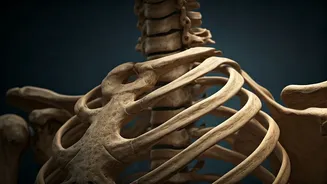Bone Health Matters
Maintaining robust bone health is pivotal for overall well-being, yet many overlook its importance. Bones are dynamic tissues, constantly renewing themselves,
and peak bone mass is usually attained in early adulthood. After the age of 30, a natural process of bone breakdown surpasses bone formation, gradually leading to decreased bone density. This decline renders individuals more susceptible to fractures and conditions like osteoporosis. Therefore, adopting preventative measures and incorporating bone-strengthening exercises becomes critical. Prioritizing bone health involves understanding the natural aging process and proactively taking steps to support skeletal integrity. This includes proper nutrition, sufficient intake of Vitamin D and calcium, and engaging in regular physical activity. These practices contribute to maintaining strong bones throughout life, ensuring mobility and quality of life in later years.
Weekly Exercise Regimen
To effectively safeguard bone health, implementing a structured weekly exercise plan is essential. The core component involves performing weight-bearing exercises, which stimulate bone growth and density. Such activities place a small amount of stress on the bones, prompting them to adapt and become stronger. This can include brisk walking, jogging, dancing, and climbing stairs. The intensity and duration can be adjusted to match individual fitness levels, starting with 30 minutes of moderate-intensity exercise, a few times a week, gradually increasing the duration and frequency. Incorporating resistance training, such as using light weights, resistance bands, or even bodyweight exercises like squats and push-ups, is equally crucial. These exercises build muscle, which further supports bone health by placing additional stress on the skeleton. Aim for at least two to three resistance training sessions per week, targeting all major muscle groups. Additionally, balance exercises like yoga or Tai Chi help prevent falls, which can lead to fractures, especially in older adults.
Dietary Support Needed
Alongside exercise, nutrition plays a crucial role in maintaining bone health. Consuming a diet rich in calcium and Vitamin D is paramount. Calcium is the fundamental building block of bones, providing structural strength. Vitamin D aids in calcium absorption, ensuring the body can effectively utilize this mineral. Dairy products, fortified foods, leafy green vegetables, and oily fish are excellent sources of both calcium and Vitamin D. The recommended daily intake of calcium varies by age and sex, but a general guideline for adults is 1,000 to 1,200 milligrams per day. Vitamin D requirements are typically 600 to 800 international units daily. If dietary intake is insufficient, supplementation may be necessary, but it is always advisable to consult a healthcare professional before starting any supplements. Furthermore, limit excessive intake of sodium and caffeine, which can hinder calcium absorption, and focus on overall balanced eating patterns that support general health and well-being.
Long-Term Benefits Realized
The consistent implementation of this exercise plan and dietary adjustments yields substantial long-term benefits. Regular weight-bearing and resistance exercises stimulate bone remodeling, maintaining bone density and lowering the risk of fractures as individuals age. These exercises also strengthen muscles, improve balance, and increase overall mobility, leading to enhanced quality of life. Bone-healthy eating habits, incorporating calcium and Vitamin D, further fortify skeletal structure. By prioritizing these practices, individuals can proactively mitigate the effects of bone deterioration and preserve their independence and vitality. The long-term advantage goes beyond physical well-being. It promotes a positive mindset and a proactive approach to health, empowering individuals to take control of their well-being. This proactive approach reduces the likelihood of chronic conditions, leading to a more active and fulfilling lifestyle, particularly in the later years of life.
Consult Your Doctor
Before commencing any new exercise program or significantly altering dietary habits, consulting with a healthcare professional is crucial. A doctor can evaluate an individual's current health status, bone density, and potential risk factors. They can also offer personalized advice, tailoring exercise recommendations and dietary guidelines to suit specific needs and medical history. This might involve additional diagnostic tests to assess bone health. For example, a bone density scan (DEXA scan) measures bone mineral density and helps identify the presence of osteoporosis or osteopenia. Based on the evaluation, the doctor can provide tailored advice and refer individuals to specialists, such as physical therapists, nutritionists, or certified personal trainers, to receive more detailed and specialized guidance. This ensures a safe and effective approach to bone health, preventing potential injuries and optimizing results. Regular check-ups enable healthcare providers to monitor progress, adjust strategies, and make necessary modifications to the plan as needed.




















